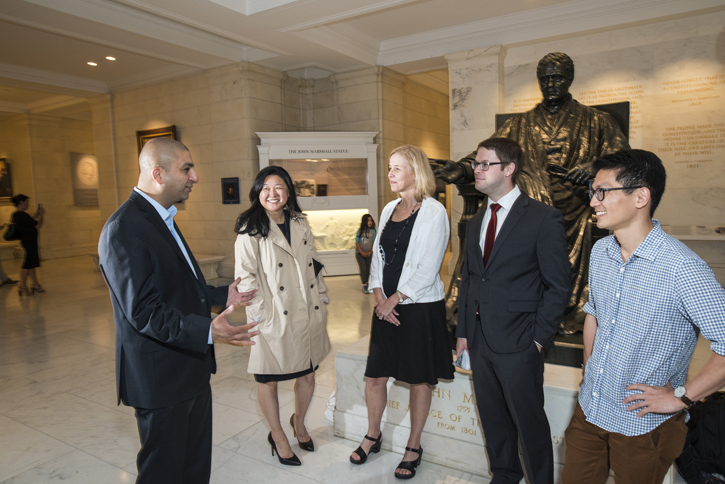
Although he said he will miss working at the Supreme Court, Jamil Jaffer is just as happy to be back in the classroom as a professor at George Mason University’s Antonin Scalia Law School.
In July, Jaffer completed a three-month stint as a law clerk for newly confirmed Supreme Court Justice Neil M. Gorsuch. He returns to George Mason’s classrooms, he said, with the kinds of insights only firsthand experience can impart.
“Working on the lead-up to Justice Gorsuch’s nomination and subsequent confirmation, as well as a law clerk to the justice at the Supreme Court during his first three months on the bench, will help me provide students with some insight on the process of how a justice is nominated and confirmed, how the court works on a day-to-day basis, and the range of opportunities Mason students might have to work with the courts, whether it’s at the Supreme Court or other courts at the local, state, and federal levels,” he said.
Jaffer, who is also the founder of the law school’s new National Security Institute, was selected for the prestigious clerking position—justices typically employ only four clerks; the chief justice may hire five—because he had clerked for Gorsuch before, when Gorsuch was a new judge at the United States Court of Appeals for the Tenth Circuit in Denver, Colo. The other clerks and staff that helped Gorsuch get started were very close to him as well, Jaffer said.
“Justice Gorsuch was confirmed on a Friday, started working on Monday, and by the next Monday had to be prepared to handle 13 cases for the April sitting of the court,” he said. “So he got a small group of his experienced former law clerks and staff together to help him with that process.”
Jaffer said although he will miss working at the Supreme Court, he looks forward to the relatively more predictable hours of working at a cybersecurity startup, teaching his National Security Law course and helping quarterback the institute, as well as continuing his academic work at Scalia Law and his visiting fellowship with the Hoover Institution.
“At the court the in-person hours can get pretty long,” he said. “And in certain instances, the work can keep you at One First Street into the wee hours of the morning. … Now I’ll probably see my family on evenings and weekends more, although I’m not sure I’ll be doing all that much less work.”
This article was originally published by Buzz McClain for the News at Mason website here.
